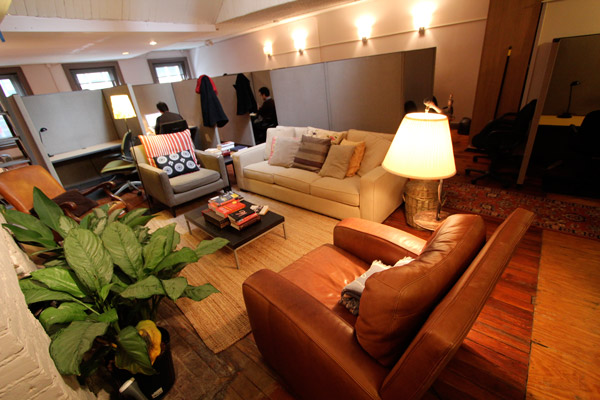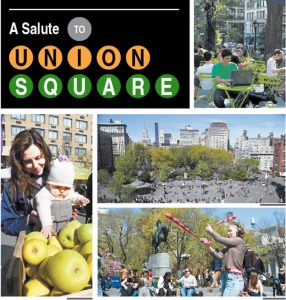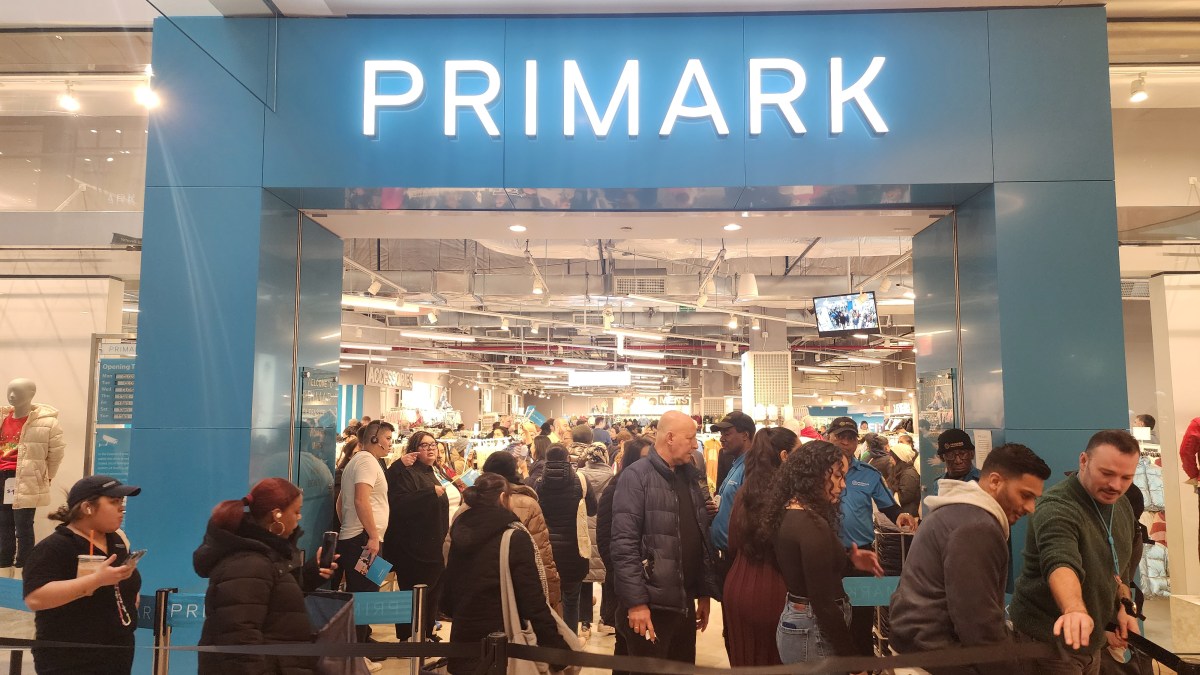

BY MAEVE GATELY | Halfway down 14th St., between Fifth and Sixth Aves., a nondescript door leads up two flights of stairs, past a bartending school and onto a landing. The sign on the door reads, “Paragraph: Workspace for Writers.”
Tucked away from the sirens and the grime of the busy thoroughfare, this is a place of serenity, of escape. It is a place, above all else, of words.
Paragraph, a members-only co-working space for writers, was founded in 2005 by Lila Cecile and Joy Parisi, two graduates of The New School’s M.F.A. program who sought a consistent, quiet place to work and a community like the one they had in graduate school. The space is composed of two sections: the kitchen, in which members can make short phone calls or chat with one another, have a cup of tea or a meal; and the writing space, which feels like a cross between a library and a living room.
A long, lofted space with skylights, couches and bookshelves, the writing room is divided by soundproof walls into 38 cubicles for the writers to work in. Paragraph’s members include freelance writers in need of their own offices, journalists, academics, novelists, poets, teachers and graduate students seeking a quiet, dedicated space in which to work.
Amy Meng, the organization’s office manager, describes it as “a space built for grad school writers — the kind of place you can’t really get anywhere else in New York.”
As Meng explained it, there are two different levels of membership, depending on the writer’s budget and time requirements. All members are given a key to the door downstairs and an access code to the space itself. The full-time membership allows the writer to come in at any time, while the part-time membership gives access from 6 p.m. to 11 a.m. during weekdays, and 24 hours on weekends. The part-time membership is geared toward writers who have full-time jobs or classes and can only come in during the evening hours. Depending on whether the writer opts for a month-to-month membership or commits to a quarterly or semi-annual enrollment, the rates vary, ranging from $93 per month (semiannual part-time) to $178 (month-to-month, full-time).
The online application is intended to determine whether the applicant is a full-time writer and asks for the names of the writer’s current projects and published works, as well as three references. Intended to “gauge seriousness of intent,” the application is designed to screen out members who may be disruptive or disrespectful of the space. Though many of its members are published and well-respected, Paragraph accepts beginning writers as well, as long as they are dedicated and able to work well in a shared setting.
But why pay $100 per month to do what could arguably be accomplished in a living room or cafe? Meng explained that the space itself is silent and free of the distractions of a home office, and the productivity that members experience is unparalleled.
After trying Paragraph out for a month, writers say they are amazed at the uptick in their productivity — after returning home, they notice the small distractions (footsteps from an upstairs neighbor, a cat that demands to be fed) that had been keeping them from getting work done. In a cafe, or even their own homes, writers tend to find “everyone else’s intentions coming up against [their] own,” a fact that is distracting unto itself. Members return to the space, she said, because “they do not realize how much more they can get done” until they experience it.
There is another productivity boost, however, one that comes from the communal nature of the space. Surrounded by other writers working on their own projects, members experience “more guilt or more inspiration, depending on the person.” Meng laughed.
“It’s great,” she said, “you’re like, everyone is fighting the same good fight as me.” Novelists tack up parts of their current books to the walls of their cubicles. Others bring inspirational postcards. The couches by the nonfunctioning fireplace are big enough to take a nap on, and books on writing and revision, dictionaries and literary journals fill bookshelves and cover coffee tables. It is a cozy space, at once familiar and purposeful, allowing members to relax while they settle into a productive routine.
In addition to keeping up the space and providing members with complimentary coffee, tea and candy (the latter which is apparently wildly popular), Paragraph organizes roundtable classes, a newsletter with announcements of publications and deals from members and monthly readings of members’ work at the KGB bar in the East Village. Some writers come and go without interacting, working on their projects and then leaving, while others find a true community at Paragraph. They strike up a conversation in the kitchen; become each other’s babysitters, workshop partners, genuine friends.
“You could live your life in here,” Meng said, and laughed.
At the end of my visit, I went and sat in a cubicle for a few minutes, to see what it felt like to be one of the members. The space is quiet, save for the percussive tap on computer keyboards, the occasional creak of wooden floorboards and the soft rustle of various members sitting down and standing up. I wrote in my notepad for a few minutes, and then closed my eyes, feeling the floor move beneath me, listening to stories being born.



































